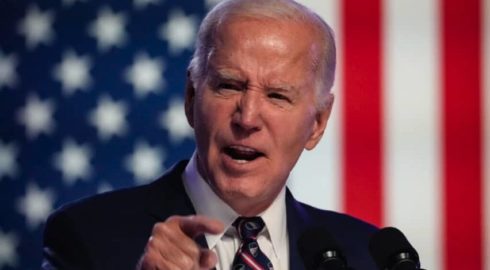Top Democrats on Sunday firmly dismissed the idea of replacing President Joe Biden as the Democratic nominee for the 2024 presidential race. Despite a weak debate performance, leading figures in the party urged members to concentrate on the implications of a second Donald Trump presidency. Over the past few days, internal discussions about Joe Biden’s candidacy and the potential outcomes of the upcoming November 5 election have been intense. Nevertheless, Democratic leaders have decisively rejected the notion of nominating a younger candidate, reinforcing their support for Biden.
President Joe Biden, 81, was reportedly at the Camp David presidential retreat with his family, likely contemplating his political future. Despite this, the calls for him to step down persisted. A recent CBS poll revealed a 10-point increase in the number of Democrats who believe Biden should not seek re-election, rising to 46% from 36% in February. The Atlanta Journal-Constitution editorialized on Sunday, stating, “The unfortunate truth is that Joe Biden should withdraw from the race, for the good of the nation he has served so admirably for half a century. The shade of retirement is now necessary for President Biden.”
Democratic Leaders Rally Behind Biden
Despite growing concerns and a notable dip in poll numbers, key Democratic figures continue to rally behind President Biden. Georgia Democratic Senator Raphael Warnock, seen as a potential replacement for Joe Biden, staunchly defended the President. “Absolutely not,” Warnock said in response to suggestions that Biden should step aside. He emphasized that poor debate performances can happen to anyone and shifted focus to the broader stakes of the election. “The question is, ‘Who has Donald Trump ever shown up for other than himself and people like himself?’ I’m with Joe Biden, and it’s our assignment to make sure that he gets over the finish line come November,” Warnock told NBC’s Meet the Press.
House of Representatives Democratic leader Hakeem Jeffries echoed this sentiment, acknowledging Biden’s debate setback but framing it as an opportunity for a strong comeback. Jeffries, who could become Speaker of the House if Democrats regain control, stressed the need for a unified and forward-looking approach. “I believe a setback is nothing more than a setup for a comeback,” Jeffries stated on MSNBC. “So the moment that we’re in right now is a comeback moment, and it’s going to require all of us to lean in, articulate a forward-looking message as to why the Democratic platform is best equipped to deal with the challenges facing the American people.”
Focus Shifts to Preventing a Trump Return
As the debate over Biden’s candidacy continues, Democratic leaders are urging the party to focus on the broader implications of the election, particularly the potential return of Donald Trump to the presidency. The narrative from party stalwarts emphasizes the need to prevent another Trump administration, which they argue would be detrimental to the nation’s progress and stability. This strategic pivot aims to consolidate support around Biden by highlighting the stakes involved in the upcoming election.
The discourse among Democrats is increasingly centered on the potential risks of a Trump presidency. By emphasizing the long-term consequences of the election, Democratic leaders hope to galvanize their base and ensure robust turnout in November. This strategy is designed not only to solidify Biden’s candidacy but also to unify the party around a common goal. As the campaign progresses, the emphasis on preventing a Trump resurgence is likely to become a central theme, reflecting the high stakes perceived by Democratic leadership.
Republican Criticism and Joe Biden’s Family Gathering
Republicans have seized upon Joe Biden’s debate performance as a broader critique of his presidency. Senator Lindsey Graham of South Carolina dismissed the notion that Biden’s poor showing was an isolated incident, arguing instead that it was indicative of a more substantial pattern of failures throughout his presidency. Graham’s comments reflect a broader Republican strategy to capitalize on perceived weaknesses in Biden’s leadership.
In contrast, former President Donald Trump used his own debate appearance to reiterate a series of long-standing, yet debunked claims. Trump’s rhetoric, which included assertions about a migrant crime wave, Democratic support for infanticide, and his false victory in the 2020 election, aimed to energize his base while discrediting his opponents. Amid this political turbulence, Biden retreated to Camp David for a planned family gathering. This event, attended by his wife Jill Biden, their children, and grandchildren, offered a moment of respite and reflection. The presence of his family, who have been pivotal in his past decisions to seek the presidency, adds another layer of scrutiny and speculation regarding his future plans.
As Biden navigates these personal and political challenges, the support from his party and the critical eye of the opposition will continue to shape the narrative leading up to the election. Whether he decides to continue his re-election bid will be a crucial decision influenced by both his performance and the unwavering support from key Democratic figures.














